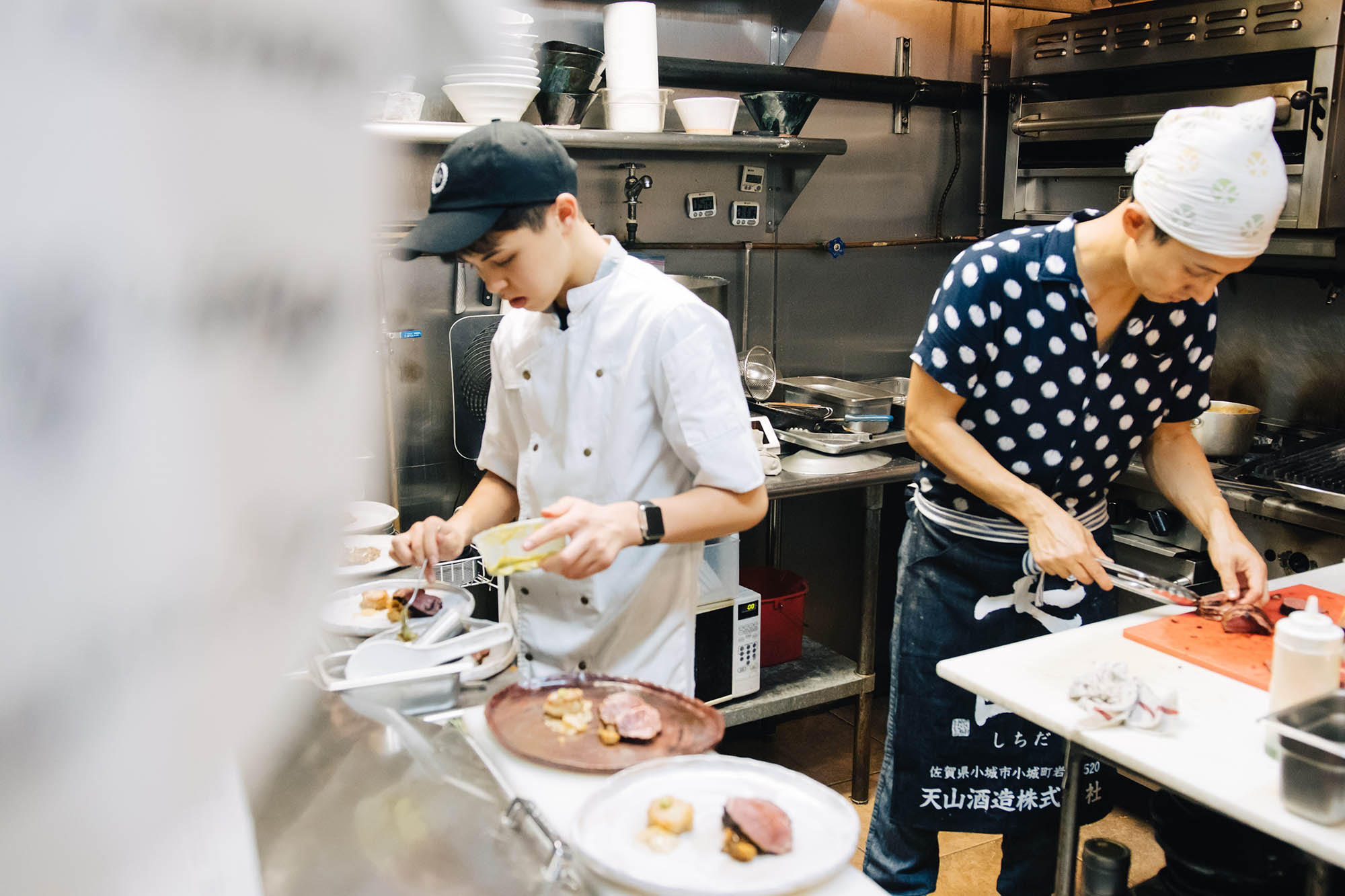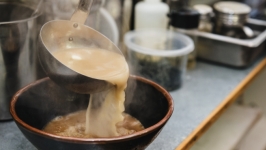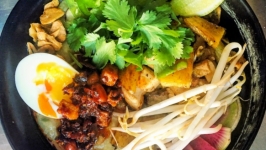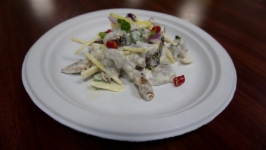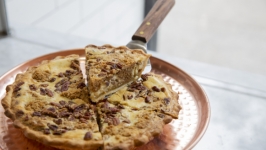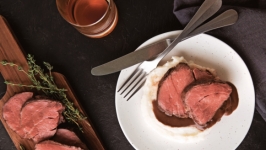Meet Queens’ Ramen-Obsessed Teen Chef
15-year-old Forest Hills native Josh Reisner on why he fell in love with cooking, what it means to be a teen chef and how he navigates the cultural nuances of his favorite food: Ramen.
It’s the middle of summer vacation, but Josh Reisner doesn’t have a single free day.
Like many 15-year-old boys, Reisner enjoys playing Fortnite, collecting sneakers and catching up with friends. But unlike many of his peers, Reisner spent the better half of the summer before his sophomore year staging in kitchens around New York City, attending restaurant openings with other chefs and hosting his own pop-ups.
At one of his recent events—a sold-out, ramen-focused dinner hosted at Shuya Cafe de Ramen in Astoria—Reisner worked with chef-owner Shuya Miyawaki to craft a summer menu of Japanese dishes. Reisner’s final dish was a standout: his “summer garden” ramen, made with smoked garlic scapes and a housemade garlic scape kimchi emulsified in Shuya’s light chicken broth. Crowning the decadent bowl was sous-vide Koji-aged filet mignon, twirled up with grilled garlic scapes and lotus root.
Reisner is too busy to chat at his dinner, where he’s flitting from table to table checking on guests, prepping ingredients for coming courses and even washing dishes. So we agree to meet the following week at Hanoi House, a Vietnamese canteen in the East Village, where he asks about the different styles of pho, listening inquisitively as I explain the subtleties of northern versus southern. Between grateful slurps of a pho he approves of, Reisner says he likes to stay busy during the summer since he doesn’t have to think about schoolwork.
“In the school year, it’s really hard to manage because I still want to work and have time to hang out with my friends,” he says. “But balancing all of that is what will prepare me to open a restaurant. Whether it’s PR stuff, front-of-house or cooking, it really teaches me how to multitask.”
Reisner has been grooming himself to become a chef for a long time. Discovering that he enjoyed cooking when he was just 5 years old, Reisner enrolled in Forest Hills’ Young Chefs Academy with the support of his parents, Brad and Serena, who are serious food lovers themselves. (Reisner remembers them taking him to Momofuku Noodle Bar when he was just 4 or 5). At age 10, he competed in the second season of Fox’s “MasterChef Junior,” placing in the top eight finalists.
“As soon as I got home—maybe even in the middle of filming—I said, ‘I want to do this for the rest of my life,’” he recalls.
In the last four years, Reisner has parlayed the experience—and fame—he found on the show to accelerate his culinary training. In 2015, he began interning at Brooklyn Kitchen, where he found a mentor in Kenshiro Uki, the vice president of operations at famed ramen noodle supplier Sun Noodle. Under Uki’s wing, Reisner began volunteering and staging at Ramen Lab, the Lower East Side ramen shop featuring a rotating roster of ramen chefs from around the world. It was a turning point. Reisner became obsessed with the stuff, and went on to extern at the now-shuttered Momofuku Má Pêche, observe at Long Island City’s Ramen Shack and, this summer, stage at the upscale East Village Hawaiian restaurant Noreetuh.
“You mostly need to show people that you’re interested and ready to respect their way of cooking,” Reisner says. “As long as you say to someone you really want to learn from them, most people will want to work with you.”
That’s how the Shuya pop-ups came about (“Shuya Café was right near my school, so I would go there a lot,” Reisner says). Eventually, Miyawaki invited Reisner in to learn how to make a tuna bone broth, and Reisner shared with the chef his own brand of ramen, which hinges on seasonality and French culinary techniques he’s picked up from his staging.
Reisner explains that having different styles of ramen is common. In Japan, various regions and ramen chefs showcase different broths, seasonings and toppings—from the miso ramen of Hokkaido in the north to the Tokyo-style shio and shoyu varieties. “It’s like different dialects of the same language,” says Reisner. “My style is very seasonal—I emulsify puréed and fermented vegetables with whatever broth the flavors go with. When we did the pop-up at Shuya in the fall, I used a smoked, grilled butternut squash.”
Reisner comes from a multicultural family: his father is Jewish and his mother is Chinese. He grew up watching his maternal grandparents make traditional food, like Hainanese chicken. “I’d sometimes help them in the kitchen, but it’s kind of chaotic,” he says. “One of my favorite things my grandfather makes is soup with pork wrapped in fish intestines. I didn’t grow up eating chicken nuggets and french fries.” One of his goals is to one day pay homage to his family’s cooking.
But because he isn’t Japanese, Reisner is intensely concerned with making sure he respects the cultural sensitivities surrounding ramen—or any food he makes. (At one point, he asks me, “As a writer, what do you think of white chefs who make Asian food?”). He’s also wise beyond his years when it comes to equitable kitchen culture, and the problems that face the industry in the wake of the #MeToo movement.
“Just after ‘MasterChef,’ I read Kitchen Confidential, and I was, like, ‘Holy crap,’” he says. “Obviously that book is still on my shelf, and it’s an amazing piece of literature. But one thing I want to do differently one day when I have my own kitchen is that I want everyone who works there to go home from work and be happy. I want a work environment where people are able to be treated with respect but still have discipline.”
He adds, “I want minorities and women represented in my kitchen, and it should be a safe space for literally everyone. The idea that you need to feel disrespected to become a chef—that ship needs to sail.”
With Reisner’s upward trajectory, it might not be too long before we see that kitchen come to fruition.
Beyond cooking, he’s been building his brand on Instagram. He now has some 60,000 followers and counting. “When I started going to my first few events for ‘MasterChef,’ I learned how small of a world it is—you really need to learn how to network,” he informs me matter-of-factly. “Instagram is like networking 24/7 while keeping it personal. I don’t do sponsored posts very often, unless it’s a really cool chef company.”
Reisner concedes that he’s had to make adjustments in his life, both school-wise and personally, to pursue his goals. “When I was at Momofuku for three days a week and working all of these events at night, I barely had time to do homework,” he says. “I was doing my math homework in English [class] and my English work on the train.” He laughs, “I hope my teacher doesn’t see this.”
But Reisner says he doesn’t regret any part of his journey so far, and that he still knows when to have fun and unwind.
“When people are doing nothing—like absolutely nothing, like playing Fortnite—I’m working,” he says. “But when there’s a high school event, I’m at the high school event. I want to make sure I don’t get burned out. And at the end of the day, this stuff is just fun. It’s not just to build up a reputation. That’s why I got into cooking in the first place. It’s fun to do. I love food.”
Josh Reisner | @chefjoshr
Shuya Cafe de Ramen | @shuya_cafe_de_ramen
Hanoi House | @hanoi.house
Young Chefs Academy | @youngchefsacademy
Brooklyn Kitchen | @thebklynkitchen
Sun Noodle | @sunnoodles
Ramen Lab | @ramenlab
Ramen Shack | @ramenshacknyc
Noreetuh | @noreetuh


